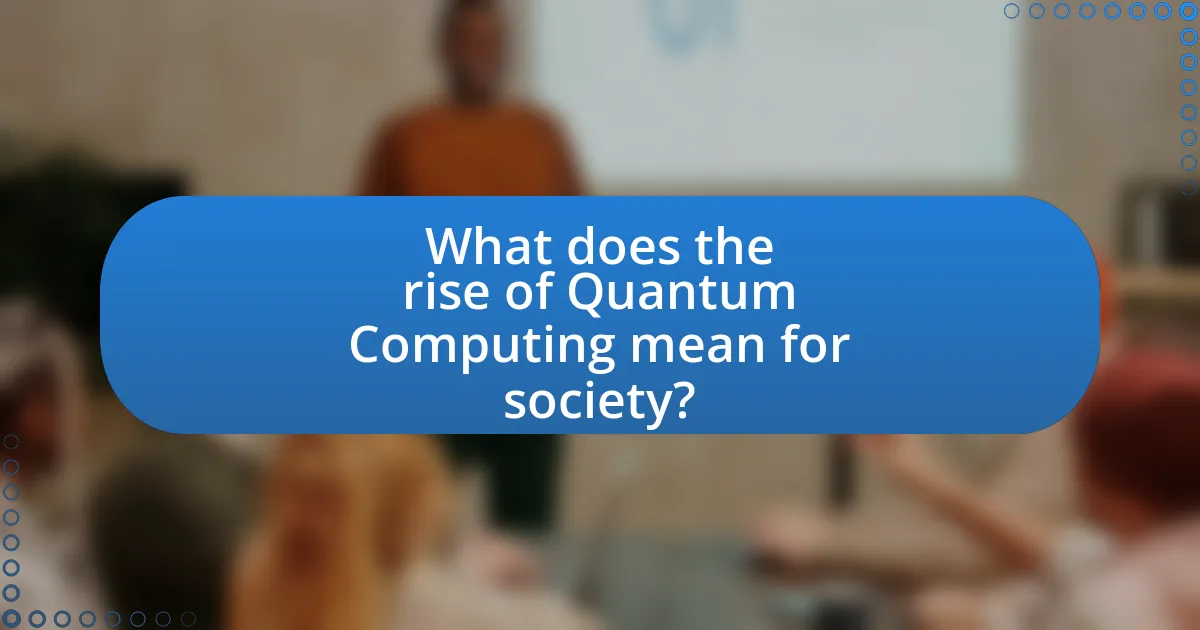Quantum computing represents a groundbreaking advancement in computational technology, utilizing quantum bits (qubits) to perform calculations at unprecedented speeds and efficiencies. This article explores the fundamental principles of quantum mechanics that enable quantum computing, such as superposition and entanglement, and contrasts it with classical computing. It discusses the potential applications of quantum computing across various industries, including finance, healthcare, and artificial intelligence, while also addressing the challenges and technical hurdles faced in its development. Furthermore, the article examines the implications of quantum computing for cybersecurity, ethical considerations, and the future job market, highlighting the responsibilities of developers in ensuring equitable access to this transformative technology.

What is Quantum Computing?
Quantum computing is a type of computation that utilizes quantum bits, or qubits, to perform calculations at speeds and efficiencies unattainable by classical computers. Unlike classical bits, which represent either a 0 or a 1, qubits can exist in multiple states simultaneously due to the principles of superposition and entanglement. This allows quantum computers to process vast amounts of data and solve complex problems, such as factoring large numbers or simulating molecular interactions, much faster than traditional computers. Research from institutions like IBM and Google has demonstrated the potential of quantum computing, with Google’s 2019 achievement of quantum supremacy showcasing a computation that would take classical computers thousands of years to complete.
How does Quantum Computing differ from classical computing?
Quantum computing differs from classical computing primarily in its use of quantum bits, or qubits, which can exist in multiple states simultaneously due to superposition. In contrast, classical computing relies on bits that are either 0 or 1. This fundamental difference allows quantum computers to perform complex calculations at exponentially faster rates than classical computers for certain problems, such as factoring large numbers or simulating quantum systems. For example, Shor’s algorithm demonstrates that a quantum computer can factor integers in polynomial time, while the best-known classical algorithms require exponential time. This capability positions quantum computing as a transformative technology with the potential to revolutionize fields such as cryptography, materials science, and artificial intelligence.
What are the fundamental principles of quantum mechanics that enable quantum computing?
The fundamental principles of quantum mechanics that enable quantum computing are superposition, entanglement, and quantum interference. Superposition allows quantum bits, or qubits, to exist in multiple states simultaneously, vastly increasing computational power compared to classical bits, which can only be in one state at a time. Entanglement creates a strong correlation between qubits, such that the state of one qubit can depend on the state of another, enabling complex problem-solving capabilities. Quantum interference allows for the manipulation of probability amplitudes, enhancing the likelihood of correct outcomes in quantum algorithms. These principles are foundational to the operation of quantum computers, as evidenced by their ability to solve certain problems, such as factoring large numbers, exponentially faster than classical computers, as demonstrated by Shor’s algorithm.
How do qubits function compared to classical bits?
Qubits function fundamentally differently from classical bits by utilizing quantum mechanics principles, allowing them to exist in multiple states simultaneously. While classical bits represent either a 0 or a 1, qubits can represent both 0 and 1 at the same time due to superposition. This property enables qubits to perform complex calculations more efficiently than classical bits, as they can process a vast amount of information concurrently. Additionally, qubits can be entangled, meaning the state of one qubit can depend on the state of another, regardless of the distance between them, which enhances computational power and speed. This capability is a key factor in the potential of quantum computing to solve problems that are currently intractable for classical computers.
What are the potential applications of Quantum Computing?
Quantum computing has potential applications in various fields, including cryptography, drug discovery, optimization problems, and artificial intelligence. In cryptography, quantum computers can break traditional encryption methods, prompting the development of quantum-resistant algorithms. In drug discovery, they can simulate molecular interactions at unprecedented speeds, significantly reducing the time required for research and development. For optimization problems, quantum algorithms can solve complex logistical challenges more efficiently than classical computers. In artificial intelligence, quantum computing can enhance machine learning processes by handling vast datasets and improving pattern recognition. These applications demonstrate the transformative impact quantum computing could have across multiple industries.
How can Quantum Computing revolutionize industries like finance and healthcare?
Quantum computing can revolutionize industries like finance and healthcare by enabling faster data processing and complex problem-solving capabilities. In finance, quantum algorithms can optimize portfolio management and risk analysis, significantly reducing computation time from days to seconds. For instance, a study by IBM demonstrated that quantum computing could enhance financial modeling and fraud detection through superior data analysis. In healthcare, quantum computing can accelerate drug discovery and personalized medicine by simulating molecular interactions at unprecedented speeds, as evidenced by research from D-Wave Systems, which showed that quantum techniques could reduce the time required for drug development by up to 100 times. These advancements highlight the transformative potential of quantum computing in enhancing efficiency and innovation across these critical sectors.
What role does Quantum Computing play in artificial intelligence and machine learning?
Quantum computing significantly enhances artificial intelligence and machine learning by enabling faster processing of complex data sets and optimization problems. Quantum algorithms, such as Grover’s and Shor’s algorithms, can outperform classical algorithms in specific tasks, allowing for quicker training of machine learning models and improved data analysis. For instance, quantum computers can handle high-dimensional data more efficiently, which is crucial for tasks like image recognition and natural language processing. Research indicates that quantum machine learning can potentially reduce the time complexity of certain algorithms, leading to breakthroughs in AI applications.
What challenges does Quantum Computing face?
Quantum computing faces significant challenges, including error rates, qubit coherence, and scalability. Error rates in quantum systems are high due to decoherence and noise, which can lead to incorrect calculations. For instance, current quantum computers can only maintain qubit states for a short duration, typically microseconds to milliseconds, before losing information. Additionally, the coherence time of qubits limits the complexity of computations that can be performed reliably. Scalability is another major issue, as building larger quantum systems requires precise control over numerous qubits, which is technically demanding and costly. These challenges hinder the practical application of quantum computing in solving real-world problems.
What are the technical hurdles in developing scalable quantum computers?
The technical hurdles in developing scalable quantum computers include qubit coherence, error rates, and scalability of quantum architectures. Qubit coherence refers to the ability of qubits to maintain their quantum state over time, which is crucial for performing reliable computations; current qubit technologies, such as superconducting qubits, face challenges in maintaining coherence times long enough for complex calculations. Error rates in quantum operations are significantly higher than in classical computing, necessitating the development of error correction methods that can effectively manage these inaccuracies; for instance, the surface code is a promising approach but requires a large number of physical qubits to encode a single logical qubit. Finally, scalability of quantum architectures poses a challenge as integrating a large number of qubits while maintaining low error rates and coherence is technically demanding; current prototypes often operate with only a few dozen qubits, while practical quantum computers will require thousands or millions of qubits to solve real-world problems.
How do issues like decoherence and error rates impact quantum computing performance?
Decoherence and error rates significantly degrade quantum computing performance by disrupting quantum states and introducing inaccuracies in computations. Decoherence occurs when a quantum system loses its quantum properties due to interactions with the environment, leading to the loss of information stored in qubits. This phenomenon limits the coherence time, which is the duration a qubit can maintain its quantum state, thereby reducing the effectiveness of quantum algorithms. Error rates, on the other hand, refer to the frequency of errors occurring during quantum operations, which can arise from various factors such as imperfect gate operations and environmental noise. High error rates necessitate error correction techniques, which can further complicate quantum computations and reduce overall efficiency. Research indicates that current quantum systems exhibit error rates ranging from 0.1% to 10%, depending on the technology used, underscoring the critical need for advancements in error mitigation strategies to enhance quantum computing viability.

How is Quantum Computing evolving?
Quantum computing is evolving rapidly through advancements in hardware, algorithms, and applications. Major tech companies like IBM and Google are developing more stable qubits, which are essential for building powerful quantum computers. For instance, IBM’s Quantum Hummingbird, announced in 2021, features 127 qubits, showcasing significant progress in qubit count and coherence times. Additionally, new quantum algorithms, such as those for optimization and machine learning, are being researched, enhancing the practical utility of quantum systems. The growing investment in quantum technology, projected to reach $24 billion by 2024, further indicates its accelerating evolution and potential impact on various industries, including cryptography and drug discovery.
What recent advancements have been made in Quantum Computing technology?
Recent advancements in Quantum Computing technology include the development of more stable qubits, improved error correction methods, and the scaling of quantum processors. For instance, IBM’s Eagle processor, which features 127 qubits, demonstrated significant progress in quantum volume, a measure of computational capability. Additionally, Google has made strides with its Sycamore processor, achieving quantum supremacy by performing a specific calculation faster than the most powerful classical supercomputers. These advancements are supported by ongoing research and collaborations among leading tech companies and academic institutions, indicating a robust trajectory for practical quantum applications in the near future.
Which companies are leading the charge in quantum research and development?
IBM, Google, and D-Wave are leading the charge in quantum research and development. IBM has made significant advancements with its IBM Quantum Experience platform, which allows researchers and developers to access quantum computers via the cloud. Google achieved a milestone in 2019 by demonstrating quantum supremacy with its Sycamore processor, completing a specific task faster than the world’s most powerful supercomputer. D-Wave focuses on quantum annealing technology and has commercialized quantum computing solutions, making it a key player in the industry. These companies are at the forefront of quantum technology, driving innovation and research in the field.
How are governments and institutions supporting quantum initiatives?
Governments and institutions are supporting quantum initiatives through substantial funding, strategic partnerships, and the establishment of dedicated research programs. For instance, the U.S. government allocated $1.2 billion to the National Quantum Initiative Act in 2018, aiming to accelerate quantum research and development. Similarly, the European Union launched the Quantum Flagship program with a budget of €1 billion over ten years to foster quantum technologies. These investments are complemented by collaborations between academia and industry, such as partnerships between universities and tech companies, which enhance innovation and application of quantum technologies.
What is the future outlook for Quantum Computing?
The future outlook for quantum computing is highly promising, with significant advancements expected in the coming years. Major technology companies, including IBM, Google, and Microsoft, are investing heavily in quantum research, aiming to achieve practical applications by 2025. For instance, IBM’s roadmap outlines plans to develop a 1,000-qubit quantum processor by 2023, which could enable complex problem-solving beyond the capabilities of classical computers. Additionally, the global quantum computing market is projected to grow from $472 million in 2021 to $8.6 billion by 2027, indicating strong commercial interest and potential for transformative applications in fields such as cryptography, drug discovery, and optimization problems.
How might Quantum Computing change the landscape of technology in the next decade?
Quantum computing is expected to revolutionize technology in the next decade by enabling unprecedented computational power and efficiency. This advancement will facilitate breakthroughs in various fields, including drug discovery, materials science, and cryptography. For instance, quantum computers can process complex simulations and optimizations much faster than classical computers, potentially reducing the time required for pharmaceutical research from years to months. Additionally, quantum algorithms, such as Shor’s algorithm, threaten current encryption methods, prompting a shift towards quantum-resistant cryptography. The anticipated growth in quantum technology is supported by significant investments from both governments and private sectors, with the global quantum computing market projected to reach $65 billion by 2030, according to a report by ResearchAndMarkets.
What are the predictions for quantum applications in everyday life?
Predictions for quantum applications in everyday life include advancements in secure communication, drug discovery, and optimization problems. Quantum computing is expected to enable unbreakable encryption through quantum key distribution, enhancing cybersecurity. In healthcare, quantum simulations can accelerate drug discovery by modeling molecular interactions more accurately than classical computers. Additionally, industries such as logistics and finance may benefit from quantum algorithms that optimize complex systems, leading to increased efficiency and reduced costs. These predictions are supported by ongoing research and development in quantum technologies, indicating a transformative impact on various sectors.

What does the rise of Quantum Computing mean for society?
The rise of quantum computing signifies a transformative shift in society, enabling unprecedented computational power that can solve complex problems beyond the capabilities of classical computers. This advancement is expected to revolutionize various sectors, including healthcare, finance, and cybersecurity, by facilitating breakthroughs in drug discovery, optimizing financial models, and enhancing encryption methods. For instance, a study by IBM and the University of California, Berkeley, highlights that quantum algorithms could potentially reduce the time required for certain calculations from years to mere seconds, demonstrating the profound impact on efficiency and innovation.
How will Quantum Computing impact cybersecurity?
Quantum computing will significantly impact cybersecurity by rendering many current encryption methods obsolete. Traditional encryption algorithms, such as RSA and ECC, rely on the difficulty of factoring large numbers or solving discrete logarithm problems, which quantum computers can solve efficiently using algorithms like Shor’s algorithm. This capability poses a threat to data security, as sensitive information protected by these methods could be decrypted in a fraction of the time it currently takes with classical computers. As a result, the cybersecurity landscape will need to evolve towards quantum-resistant algorithms, which are designed to withstand attacks from quantum computers, ensuring the protection of data in a post-quantum world.
What are the implications of quantum encryption for data security?
Quantum encryption significantly enhances data security by utilizing the principles of quantum mechanics to create secure communication channels that are theoretically immune to eavesdropping. This technology employs quantum key distribution (QKD), which ensures that any attempt to intercept the key used for encryption alters the quantum state, thereby alerting the communicating parties to the presence of an intruder. Research conducted by the University of Science and Technology of China demonstrated that QKD can achieve secure communication over long distances, reinforcing its potential to protect sensitive information against future threats posed by quantum computing capabilities.
How can Quantum Computing both challenge and enhance current encryption methods?
Quantum computing can challenge current encryption methods by efficiently solving problems that classical computers struggle with, such as factoring large integers, which underpins RSA encryption. For instance, Shor’s algorithm demonstrates that a sufficiently powerful quantum computer could break RSA encryption in polynomial time, rendering it insecure. Conversely, quantum computing can enhance encryption through the development of quantum key distribution (QKD), which uses the principles of quantum mechanics to create secure communication channels that are theoretically immune to eavesdropping. Research by Bennett and Brassard in 1984 established the foundation for QKD, showing that any attempt to intercept the key would disturb the quantum states involved, alerting the communicating parties. Thus, while quantum computing poses significant risks to traditional encryption, it also offers innovative solutions for secure communication.
What ethical considerations arise from the advancement of Quantum Computing?
The advancement of Quantum Computing raises significant ethical considerations, particularly regarding data privacy, security, and the potential for misuse. Quantum computers possess the capability to break traditional encryption methods, which could lead to unauthorized access to sensitive information, thereby compromising individual privacy and national security. For instance, a 2019 study by the National Institute of Standards and Technology highlighted that quantum algorithms could render current cryptographic systems obsolete, necessitating a reevaluation of data protection strategies. Additionally, the unequal access to quantum technology may exacerbate existing inequalities, as entities with advanced quantum capabilities could dominate various sectors, leading to ethical dilemmas surrounding fairness and equity in technology deployment.
How might Quantum Computing affect job markets and employment in tech sectors?
Quantum computing is likely to significantly transform job markets and employment in tech sectors by creating new roles while rendering some existing positions obsolete. As quantum technology advances, there will be an increased demand for specialized skills in quantum algorithms, quantum hardware development, and quantum cryptography, leading to job creation in these emerging fields. For instance, a report by McKinsey estimates that by 2030, quantum computing could create up to 1.5 million jobs in the United States alone, particularly in research and development, software engineering, and data analysis. Conversely, traditional roles focused on classical computing may decline as organizations adopt quantum solutions, necessitating a workforce transition towards quantum literacy and interdisciplinary expertise.
What responsibilities do developers have in ensuring equitable access to quantum technologies?
Developers have the responsibility to design quantum technologies that are accessible and usable for a diverse range of users, ensuring that these advancements do not exacerbate existing inequalities. This includes creating user-friendly interfaces, providing educational resources, and engaging with underrepresented communities to understand their needs. For instance, initiatives like IBM’s Quantum Educators program aim to democratize access to quantum computing education, highlighting the importance of inclusive practices in technology development. By prioritizing accessibility and education, developers can help bridge the gap in access to quantum technologies, fostering a more equitable technological landscape.
What practical steps can individuals take to prepare for a quantum future?
Individuals can prepare for a quantum future by enhancing their understanding of quantum computing through education and skill development. Engaging in online courses, workshops, or degree programs focused on quantum mechanics, quantum algorithms, and quantum programming languages like Qiskit or Cirq will build foundational knowledge.
Additionally, individuals should stay informed about advancements in quantum technology by following reputable sources such as academic journals, industry reports, and news outlets specializing in technology. Networking with professionals in the field through conferences or online forums can provide insights into practical applications and emerging trends.
Moreover, investing in quantum-safe cryptography solutions is crucial, as quantum computers pose a threat to current encryption methods. Organizations like the National Institute of Standards and Technology (NIST) are actively working on post-quantum cryptography standards, and individuals should consider adopting these solutions to safeguard sensitive information.
By taking these steps, individuals can position themselves to adapt to the evolving landscape shaped by quantum computing.


